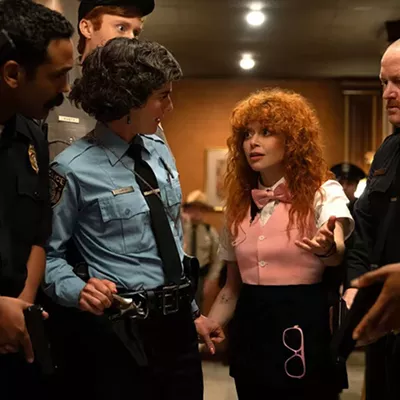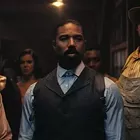If in watching the first few minutes of this film, you think you accidentally walked into some new version of The Princess Bride, don't worry. National Treasure also begins with a grandfather telling his wide-eyed grandson a story of long ago about vast riches, with the story being played out on the screen and with constant shifts back to the teller and listener. But this framing device soon disappears. The grandfather is never seen again, and the boy grows up to be Ben Gates (Nicolas Cage), now in the field of treasure hunting or, as he puts it, treasure protecting. After all these years, he's still looking for the glittering spoils his grandfather told him about, much to the consternation of his dad (Jon Voigt), who says the search is pointless, leading only to clue after clue -- even though there are twinkles in Voigt's eyes, remnants evidently of the years when he, too, was in on the search.
Call it "Treasure: The Next Generation." While you're at it, call it absurd, a story that depends on way too many coincidences for it to feel at all real. The main players have so much information rattling around in their heads -- and are so eager to share with others -- that most of National Treasure comes across as a parody.
Dad is right. No matter how many clues come by, another one is right behind -- right ahead, really, right where an answer is supposed to be. In an early scene when an addled and vociferous Ben is seen thinking and then thinking some more, determined to figure out what the newest clue means, Cage furrows his brow so intently that you can almost smell his brain at work. And then pow! He determines that an invisible map is on the back of the original Declaration of Independence, and that he and his crew of treasure-minded folks are just going to have to borrow the document and check it out. Before anyone figures out how he did that, and by the time the locale has switched from a frozen tundra to Washington, D.C., tension among the hunters' ranks has developed into would-be murderous actions, with Ben heading up the good-guy side and Ian (Sean Bean) leading the bad guys.
It's absurd how Abigail (Diane Kruger), a young woman who works at the National Archives (where the Declaration is on display), becomes so deeply involved in the film's wayward and improbable plot. Once she's mixed into the caper, her actions become inexplicable.
So goes the film, rapidly setting up its story of attempted theft via speeded-up segments accompanied by narration, then literally splitting things in half by showing simultaneously the activities of both sides -- good guys and bad -- in what amounts to some nicely done pacing and editing.
Just as things start picking up, there's an added bonus: the introduction of the FBI's involvement and the mid-film appearance of Harvey Keitel as the agent in charge. Unfortunately, it turns out to be a case of Keitel slumming it (which isn't completely his fault, because his part is underwritten). Maybe too much time was spent giving Ben too much to say, or making sure his pal Riley (Justin Bartha) got more than the requisite amount of funny lines -- which, in fairness, he delivers well. Cage, too, is good in his part. But his character is all over the place, ranging from serious to funny to nonchalant to brainy. In turn, Cage's performance comes out unbalanced, uneven.
As if the endless clue-leading-to-clue thing wasn't enough, in its latter parts, the film takes on some characteristics of the Indiana Jones series, with the action retreating underground for some inventive set pieces. With a playful hint of nudity and some relatively squeaky-clean violence, this is all harmless fun and a lot more enjoyable than it has a right to be. No one is going to complain about the audience-pleasing ending (though it takes too long to arrive). In fact, the only major flaw of National Treasure is that, like its heroes and villains, it's just a little too clever to be believed.
















